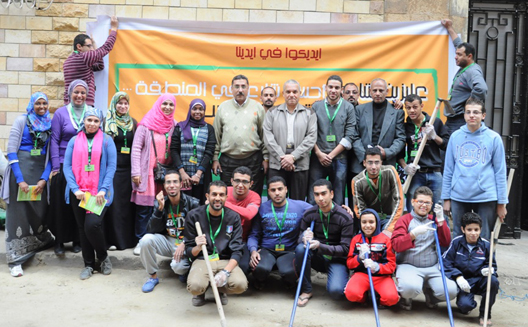Egypt's Revolutionaries Take to the Streets, To Improve Neighborhoods


“Change starts
in the streets," was a slogan coined during the Egyptian
revolution, as demonstrators took pride in cleaning the streets in
their neighborhoods. A month ago, almost two years after crowds
first took to the streets in protest, they've founded Mante2ty (pronounced
Mahn-tah-tee), an intiative to develop and revive local
neighborhoods.
Their team of 30 begins by choosing a ‘local unit’ – a street – as
a starting point, and then performing a slew of public services
such as cleaning, lightning, paving, gardening and painting. The
goal is not just to make the streets more sparkling, but to build
trust between Mante2ty and the local population. Not content to
come in from the outside or apply pre-determined models, the
ogranization then distributes surveys to familiarize themselves
with the neighborhood's critical problems. This allows them to
design future projects and seek local funding.
 An Alternative?
An Alternative?
At first glance, you may think that the project is redundant
with the work of local street cleaners, which number around 57,000
in Egypt. Since Mante2y also presents more efficient solutions to
experts and policymakers, it might put some out of a job. However,
the founders denied that this is an outcome of their work. “We are
trying to offer help by minimizing unemployment rate in certain
areas,” explains founder Youssef Hamdi.
Hamdi is a mechanical engineer who designs infrastructure networks
and aims simply to “start a new trend in developing Egypt and
making it a better place for the years to follow." This goal isn't
limited to developing neighborhoods and printing flyers, but
extends to changing locals behavior and sense of trust across
Egypt, by bringing people together to participate in these projects
and have a sense of local ownership and solidarity.

Involving Local Stakeholders
True to its vision, Mante2y's first project began by involving local leaders. On El Arish street in the Rawd Al Faraj region in Cairo, a particularly poor district that was burnt last Ramadan. The neighborhood's president Mohamed Abdl Nabi took a leading role, says Hamdi, helping to organize trash pickups from the garbage cans that Mante2ty puts in place, and promising to pave the streets.
Mante2ty also works to pressure groups that lobby Cairo's mayor for developmental solutions in these regions, says Mohamed Ibrahim, a veterinarian and developmental speaker who worked on the project. While pressuring the public sector, these groups also enhance transparency by logging these issues online.
Reviving ‘Al Waqf’
 Mante2ty also hopes to implement a longer term vision
to foster economic growth in Rawd El Faraj. The team plans to lease
the rights to an old central marketplace and build a brand new
marketplace with good security and low prices. Once it's up and
running, the organization will give the management rights back to
the neighborhood, keeping three kiosks and commercial stores under
its own management. In keeping with the Muslim tenet of Waqf, or
endowing property for charitable purposes, Mante2ty will donate a
portion of profit to the market and use the rest to build similar
markets in other neighborhoods.
Mante2ty also hopes to implement a longer term vision
to foster economic growth in Rawd El Faraj. The team plans to lease
the rights to an old central marketplace and build a brand new
marketplace with good security and low prices. Once it's up and
running, the organization will give the management rights back to
the neighborhood, keeping three kiosks and commercial stores under
its own management. In keeping with the Muslim tenet of Waqf, or
endowing property for charitable purposes, Mante2ty will donate a
portion of profit to the market and use the rest to build similar
markets in other neighborhoods.
The idea is spreading,
as other individuals in marginalized areas, such as Helwan, Nahia,
Imbaba, Faiyum, Dumyat and Asyout, look to apply the Mante2ty
concept. A major appeal is the project revives the concept of Waqf,
which was lost in our Arab communities when it became managed by
the government in the early 60s. Now, Egypt's revolution is turning
care of its streets back to local neighborhoods.


